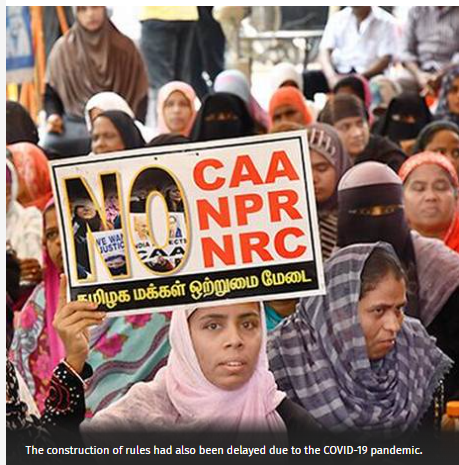Constitution Amendment Act
Figure 1: No Copyright Infringement Intended
Context:
- The Union Home Ministry has asked the parliamentary committee for more time to frame the rules of the Citizenship (Amendment) Act, 2019 (CAA), on the grounds that the consultation process is on.
Provisions of the act:
- The Bill seeks to amend the Citizenship Act, 1955; by wanting to grant citizenship to illegal non-Muslims (Hindus, Sikhs, Buddhists, Jains, Parsis and Christians) from Bangladesh, Pakistan, and Afghanistan, who came to India on or before December 31, 2014.
- The Bill proposes that all such migrants will be eligible for citizenship if they came to India before December 31, 2014.
- All pending legal cases pertaining to citizenship-related matters against them will stand abated.
- The Bill says the six non-Muslim communities “shall not be treated as illegal migrants” for violating provisions of the Passport Act, 1920, or the Foreigners Act, 1946.
- The Bill reduces the mandatory requirement of continuous stay in India from 12 years to five years for “many persons of Indian origin including persons belonging to the minority community from the neighboring countries”.
- The Bill says the amendments will not apply to the tribal areas of Assam, Meghalaya, Mizoram, and Tripura, which are included in the Sixth Schedule of the Constitution and Arunachal Pradesh, Mizoram and Nagaland that are protected by the Inner Line Permit (ILP).
Reasons behind citizenship act:
- This is a humanitarian step to grant citizenship to those who suffered for the last 70 years.
- Provisions of Constitutions of Afghanistan, Pakistan and Bangladesh provide for a specific state religion, it lead to persecution of religious minorities in these countries.
- Their right to practice, profess and propagate their religion has been obstructed and restricted.
- Bill contains provisions to grant Citizenship to such refugees on reasonable grounds, which in no way go against any provision under the Constitution of India and does not violate Article 14.
- The linguistic, cultural and social identity of the people of the North East would be preserved and this Bill contains the solution to the problems of the people of these States.
- Refugees from Uganda were also given citizenship and same steps were taken during Sri Lankan crisis.
Concerns with the act:
- It will be the first time that citizenship will be provided on the basis of religion.
- It violates Article 14 of the Constitution, which grants the right to equality.
- It violates provisions of the Assam Accord, 1985, according to which all-illegal immigrants, irrespective of religion, who entered India after March 24, 1971, were to be detected and deported.
- It may make many Bengali Hindus residing in the Northeast vulnerable to violence while also leaving several non-Muslim pockets of Pakistan and Bangladesh exposed to their country’s communal forces.
- It can have negative impact on India’s bilateral relations with a friendly neighbor like Bangladesh.
- Bill can particularly be detrimental to the interest of smaller communities, particularly the plains tribes in Assam whose areas are not protected.
- It may put a specific community – Bengali Hindus – widely seen to be the sole beneficiaries of the amendment, more vulnerable to assaults in different northeastern states based on their ethnicity.
- Only an illegal immigrant who is Muslim will be singled out, prosecuted under the Passports (Entry into India) Act, 1920 or the Foreigners Order 1949, and deprived of his personal liberty.
- While Muslim migrants should show their proof of residency in India for at least 11 years, the law allows illegal migrants from the six communities to be naturalized in five years-time.
Supreme Court approach to CAA:
- The Supreme Court refused to stay the implementation of the Citizenship Amendment Act (CAA), 2019
- There is lot of confusion in the public mind about the objectives of the CAA. Therefore, government must publicize the actual intent of the Act to reduce any confusion among the public about its objectives and aims.
- It in states that amendments made to the Citizenship Act of 1955 allowed for protecting and welcoming religiously persecuted people fleeing the three neighboring countries where Muslims form the majority.




1.png)
